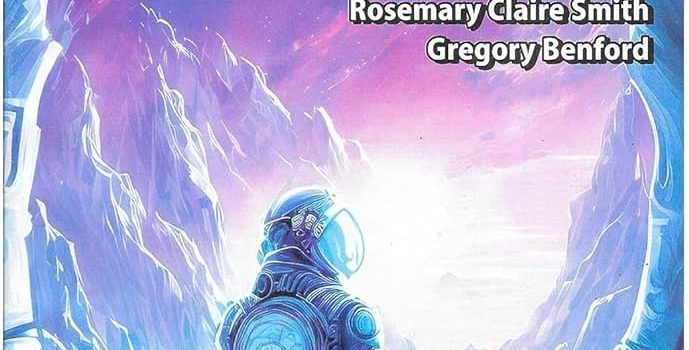A.C. Wise Reviews Short Fiction: Analog
Analog’s November/December issue includes a wide variety of short fiction. The standout story in the issue was “An Infestation of Blue” by Wendy N. Wagner, told from the point of view of a dog who wakes to find her consciousness altered through an Operator meant to allow her to communicate with humans. The dog, who now thinks of herself as Rebecca, discovers that the Man who is part of her pack is responsible for this change. The Woman is gone, and the Man is trying to find out what happened to her. Her death was ruled a suicide, but he refuses to believe it and wants Rebecca to help him trace what happened to the Woman during her last hours of life. The story is highly effective in its exploration of different types of consciousness, personal bias, and self-perception versus the perceptions of others. The Man cares for Rebecca, but also sees her as a means to an end, upending her life and rearranging her sense of self in an attempt to get an answer about his wife’s death that he already knows deep down but refuses to see. The story is lovely and occasionally heartbreaking, and Wagner packs it with emotion.
“Home for Christmas” by Ron Collins is another story that stood out. An astronaut returns to Earth to help scatter his wife’s ashes, bringing him into contact with his son for the first time. Because of time dilation, his son is older than he is, nearing the end of his own life. The son is bitter, resenting his father, but he asks him about space and why he left. The father tries to explain that leaving Earth wasn’t about leaving his family behind, but something he needed to do for himself. In under two thousand words, Collins perfectly encapsulates a strained family relationship between people who are on very different paths in life. It’s an excellent example of a story with characters who have distinctive worldviews that inform their choices, and neither is shown to be wrong or right – they are merely living their lives in the way that makes most sense to them. It’s a lovely piece, and even more impressive for all that it manages to accomplish at a relatively short length.
“The Eiffel Tower of Trappist-1d” by Jeff Reynolds is a sweet story about three colonists on a desolate world where opportunity has dried up. Kate and Ernie are contemplating leaving, but their neighbor, Harv, wants to stay where his wife’s ashes are scattered. Harv acquires some disused mining equipment and convinces Kate and Ernie to help recreate Earth’s great monuments, including the Taj Mahal, Mount Rushmore, and the Great Wall of China, among others, in hopes of drawing tourists to Trappist-1d. There is initial interest, but it dries up quickly. Just when the trio think they’ve failed, a group of aliens formerly at war with humanity arrives wanting to see the monuments and willing to pay good money for the privilege. It’s a nice look at hope, human ingenuity, and the refusal to give up, with touches of humor and a strong emotional core.
“The White Tiger” by Mark Pantoja follows a group on a mission to reclaim the remains of their former ship, which was attacked by aliens. They are being hunted by an alien Howler, resulting in a race against time as the crew contends with a robot survivor, self-aware engines, and a self-aware core, all with distinct opinions how they should be deployed. The novelette is fast-paced with a strong voice and great worldbuilding. “Apollo in Retrograde” by Rosemary Claire Smith is another novelette with a strong voice, presenting an alternate history of the space race. Natalya is an astronaut who defected from the Ukraine after the death of her son. She faces suspicion of being a communist, as well as having to deal with sexism, but after several years, she’s finally given command of the Apollo 17 mission. Her crew’s trip to the moon turns into a rescue mission, after an accident on the Russia base leaves a single cosmonaut alive. Natalya again faces suspicion, this time from the cosmonaut who views her as a traitor, but her ultimate success in saving his life leads to a new era of peace and cooperation between Russia and the US.
Overall, this issue of Analog features stories with a wide variety of ideas and themes, some taking a humorous approach, while others are more serious. A man questions his life while using an AI job search engine in David Lee Zweifler’s “Wasted Potential”. “The Disease Collector” by Tom Jolly follows a man travelling through time collecting plagues from history in hopes of finding a cure for the plague in his own time responsible for killing his family. “Hippolyta Flyby” by Michael Capobianco and “The Far Dark” by Gregory Benford both deal with scientific probes, each going rogue in their own way as they carry out research in space. “Proxima Centauri Blues” by Michael Cassutt gives readers a home invasion and a revenge plot with unintended consequences, while “Tool Consciousness” by Auston Habershaw offers up a shapeshifting character infiltrating an alien hatchery only to discover his partner has betrayed him.
“Family Business” by Andrew Dana Hudson & Corey J. White is another of the more effective pieces in the issue, tracing the rise and fall of the Weathersmith family and their company Weathersmith Carbon through multiple generations. The story starts with a disgraced CEO granting her son a parcel of land after environmental restrictions shut her company down. He starts a soil reclamation project, and eventually brings his daughter on board, who sees the land as an opportunity to increase the family fortune again. The vignettes that make up the whole flow together nicely, showing descendants with distinct goals from their ancestors, some trying to improve on their work, while others backslide in corruption, or mere indifference. The story does a good job of showing values evolving over time, children and parents with differing goals, and how technology and our understanding of the environment might change over time.
The novella, “Flying Carpet” by Rajnar Vajra brings the issue to a strong close. Jackson and his wives Alyse and Devorah are drawn into a murder investigation after a family is found dead in their home. At first they suspect a malfunction in the victims’ HOST, a smart house system, but they soon discover that CARPET, the citywide monitoring system, has been tampered with – evidence that both systems have been hacked in order to cover up a crime. Two more families are murdered, and Jack, Al, and Dev each contribute their own expertise to finding the link between the families and uncovering the truth. They discover that one member of each of the murdered households was formerly a member of a hacker collective. They set out to find the last surviving member of the collective, and discover that he’s not only been living under an assumed identity for years, but he is a fellow member of the police force that employs both Jack and Dev. The novella is smoothly written, with strong characters, and the denouement and final showdown is tense and effective. Sadly, a note following the novella indicates that the author, who was a frequent contributor to Analog, passed away in May 2023, prior to the novella’s publication.
Recommended Stories
“An Infestation of Blue”, Wendy N. Wagner (Analog 11-12/23)
“Home for Christmas”, Ron Collins (Analog 11-12/23)
“The Eiffel Tower of Trappist-1d”, Jeff Reynolds (Analog 11-12/23)
A.C. Wise is the author of the novels Wendy, Darling, and Hooked, along with the recent short story collection, The Ghost Sequences. Her work has won the Sunburst Award for Excellence in Canadian Literature of the Fantastic, and has been a finalist for the Nebula Awards, Stoker, World Fantasy, Locus, British Fantasy, Aurora, Lambda, and Ignyte Awards. In addition to her fiction, she contributes a review column to Apex Magazine.
This review and more like it in the February 2024 issue of Locus.
 While you are here, please take a moment to support Locus with a one-time or recurring donation. We rely on reader donations to keep the magazine and site going, and would like to keep the site paywall free, but WE NEED YOUR FINANCIAL SUPPORT to continue quality coverage of the science fiction and fantasy field.
While you are here, please take a moment to support Locus with a one-time or recurring donation. We rely on reader donations to keep the magazine and site going, and would like to keep the site paywall free, but WE NEED YOUR FINANCIAL SUPPORT to continue quality coverage of the science fiction and fantasy field.
©Locus Magazine. Copyrighted material may not be republished without permission of LSFF.







